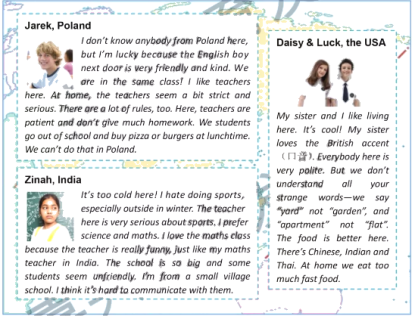
科目: 來(lái)源: 題型:
【題目】— It’s cold here. — OK. I___________ the window.
A. closed B. will close
C. close D. was closing
查看答案和解析>>
科目: 來(lái)源: 題型:
【題目】I’m _____ in collecting stamps at all.
A. interested B. interesting C. not interesting D. not interested
查看答案和解析>>
科目: 來(lái)源: 題型:
【題目】— Did you hear of __________ boy called Jim? Yes, he is ________ honest boy.
A. a; the B. a; a C. a; an D. the; an
查看答案和解析>>
科目: 來(lái)源: 題型:
【題目】 I think the skirt on the desk can't be Lucy's. _ is made of- wool.
A. Hers B. Herself C. Her D. She
查看答案和解析>>
科目: 來(lái)源: 題型:
【題目】Something smells ____, and you are supposed to clean your house often.
A. good B. nice C. terribly D. terrible
查看答案和解析>>
科目: 來(lái)源: 題型:
【題目】—Alex, the bus is coming, but I have to go back to change my coat.
—_______, or we’ll miss it.
A. Be quiet B. Hurry up C. Be careful D. Get up
查看答案和解析>>
科目: 來(lái)源: 題型:
【題目】 Every year, more than 26,000 children arrive in Britain. We ask some new arrivals what they like best about their new lives and what’s different from home.

【1】Among the above four children, ____ probably likes the new school life best.
A. LuckB. ZinahC. JarekD. Daisy
【2】In Zinah’s eyes, her maths teacher in India might be ____.
A. coldB. strict C patient D. humorous
【3】The passage is probably taken from ____.
A. a travel magazineB. an education website
C. a geography textbookD. a business newspaper
查看答案和解析>>
科目: 來(lái)源: 題型:
【題目】Sally _____ a very interesting country.
She often gets up _____ night.
A. come from, at B. is from, at C. are from, on D. live in, on
查看答案和解析>>
科目: 來(lái)源: 題型:
【題目】----Please tell me ___________________an hour ago.
---He rode his bike.
A. how does he go to school. B. where he went
C. how he went to school D. what did he do
查看答案和解析>>
科目: 來(lái)源: 題型:
【題目】
A large numbers of emojis (表情符號(hào)) are sent online every day. Emojis are pictures used in texts and web pages. Since emojis were invented in the late 1990s, they have been used as a modern international languages.
We like emojis for different reasons. A written message is always black and white, but emojis show meanings beautifully. Sometimes emojis also change the way we write. The more emojis we use, the fewer words we use.
There are many emojis with different meanings. They are easy to understand. For example, a smiling face means “I’m happy”. A cake with candles means “Happy birthday”. When we want to say “Goodbye”, we use a smiling face with a waving hand. When we are in a terrible situation but we have to laugh to cheer ourselves up, we can use a “cry laugh” emoji.
Now emojis have great influence on us. Sometimes, emojis can be helpful to people from different countries in understanding each other. And when we are feeling exchange. Then the invention of emojis helps change the situation. For example, when we receive a smiling face from our friends online, we try to exchange our feelings by sending the same picture.
It seems that emojis change as time goes by. However, we should be careful when we use them online.
Emojis | |
Brief introduction | Emojis are 【1】 that we use in texts and web pages. Emojis have been used as a 【2】international languages. |
Reasons for their popularity | Emojis can show 【3】beautifully. Emojis change the way we 【4】. |
Examples of emojis | A smiling face means “I’m happy.” A cake with 【5】 means “Happy birthday.” A smiling face with waving hand means “Goodbye”. A “cry-laugh” emoji means we want to 【6】up. |
The 【7】 of emojis | Emojis can 【8】 people from different countries to understand each other. Emojis can allow us to exchange our 【9】. |
Conclusion | We should be 【10】when we use emojis. |
查看答案和解析>>
百度致信 - 練習(xí)冊(cè)列表 - 試題列表
湖北省互聯(lián)網(wǎng)違法和不良信息舉報(bào)平臺(tái) | 網(wǎng)上有害信息舉報(bào)專區(qū) | 電信詐騙舉報(bào)專區(qū) | 涉歷史虛無(wú)主義有害信息舉報(bào)專區(qū) | 涉企侵權(quán)舉報(bào)專區(qū)
違法和不良信息舉報(bào)電話:027-86699610 舉報(bào)郵箱:58377363@163.com